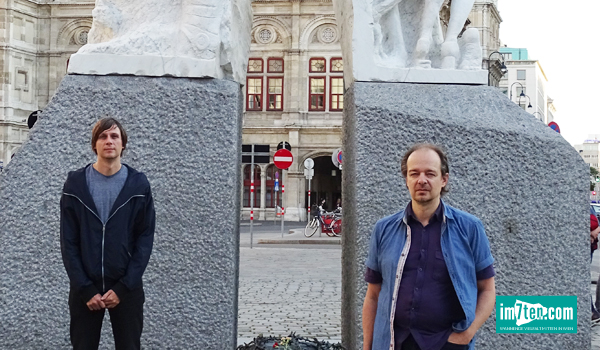At the opening of “Stones of Remembrance” 1 October 2017, art installations were arranged at 5 different places on Westbahnstraße. In Westbahnstraße 27-29 there was one by Günther Puller and Lazar Lyutakov. Im7ten spoke to both artists about their work prior to the opening.

I met with Günther Puller and Lazar Lyutakov for an interview in a traditional Viennese coffee house in town. With the classical Viennese waiter, the small round coffee house tables with heavy marble tops, the politeness, the clientele and the contrast between nostalgic seriousness and modern lightness.
Going to a traditional Viennese coffee house is like traveling in time – 100 or 150 years into the past. Into a world where our dark past was yet to come. There is a continuous coming and going. Briefcases, elegant purses, shopping bags and large bouquets. In the middle of the table lays my cellphone recording our talk a midst the havoc of voices, conversations and other sounds like clinking spoons on coffee cups. It is one situation in one environment. Something that changes with every different perspective. At first glance it seems to be an obvious interview situation but after a closer look it becomes surreal and abstract – because the spoken word is hard to grasp and creates a contrast to the here and now. But then again, the spoken is easy to grasp when one dares to change ones point of view. In that sense, our conversation is a sneak preview for the “performance” by the two artists in Westbahstraße 27-29 that can be seen either as a situation or as an environment.
What is the concept of your contribution to “stones of Remembrance”?
Our initial question was how to deal with documents and research: What does documentation mean and how to deal with people who were deported whose story is now accessible in lists in the internet. How precise should, could, must art be in presenting details?
What were your findings?
Our research started with difficulties. There are several archives that are relevant for researching NS victims, however it was complicated to obtain information beyond name, date of birth or date of deportation. That was the critical point where I thought that this topic goes beyond individuals alone.
Lazar Lyutakov: It is in the nature of art to view things more generally and to express more than what one could say about personal fate. Good art has the ability to get more meaning out of something even though it refers to something personal. This is why we faced the question: Do we really want to know more about the person and what would it entail? What more could we know? Just reading seven more sentences about a person does not mean that we know about them. Maybe we know even less. Everything is relative. What we want is to do something beautiful and meaningful. Bureaucracy made deportation easier to view human beings as numbers and to deport them.
….and now bureaucracy stands in the way of getting access to personal data and more information.
Günther Puller: Right. Meanwhile I think that our approach allows the spectator to imagine.
How did this project find you?
Günther Puller: Thomas Kreuz approached me and I chose a house on the list: Westbahnstrasse 27-29. I went there and noticed that it is the house where Lazar has one of the local studios. I wanted to invite Lazar already before I knew that this is the house and thus one thing let to the other.
Why did you think of Lazar to support you in this project?
Günther Puller: With Lazar, the everyday things influence the way he expresses himself.
Lazar Lyutakov: I am interested in the normality of everyday topics and objects. I find the reference to terrifying and overwhelming historical facts interesting. When we think about normality in the context of the past, we determine the normality as taking everything away from people and taking them to places where they just disappeared.
Günther Puller: It is interesting how differently people deal with things since Lazar is originally from Bulgaria (which played an entirely different role in WWII – editor’s note). It is very unusual for me to hear that. Historically, Lazar has a very different point of view.
Lazar Lyutakov: It is all different! Bulgaria was on the side of Germany in WWII but through political tug-of-war it was possible to avoid the demanded deportation of Bulgarian Jewish citizens and so most were able to stay in Bulgaria. That is why the topic is not an open wound in Bulgaria. This difference between the two countries was one of the major differences I noticed when I came to Vienna as a 20 year old. I knew that there was unprocessed history – I did not further ponder on it – but it was clear to me that it remained a sensitive topic. That is why I am involved in this project in many ways: my work, my way of working but also by being in the same building. Since my working space is supported by the federal government, I am actually getting support where others did not. On the contrary! This has the potential to show a point of view which is very close to reality and due to the changes of circumstances is even quite poetic.
Find more information about the artists under gunterpuller.com and azarlyutakov.com.
All details about “Stones of Remembrance” under „www.steinedererinnerung.at







